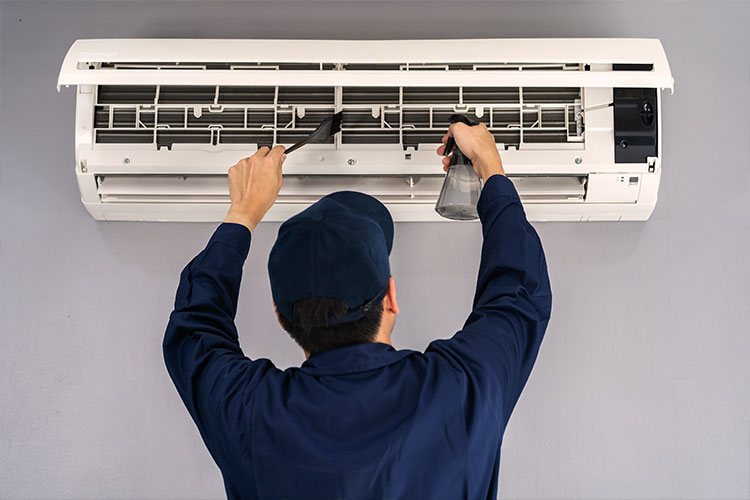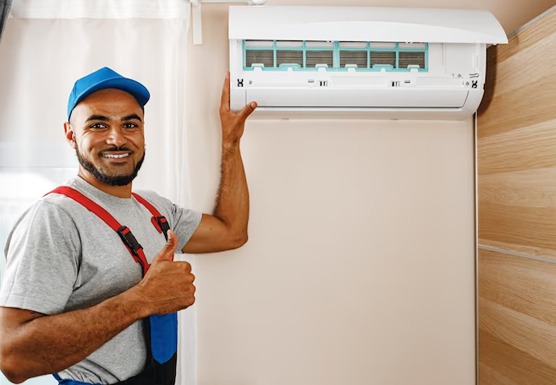Ac Fixing: Repair Work The Cooling System To Bring Back Comfy Indoor Temperatures
Identifying Common A/c Unit Issues
Ever discovered yourself sweltering in the middle of a heatwave, only to realize your air conditioning unit isn't cooling as it should? It's frustrating, but more typical than you may believe. Many homeowners deal with these problems yearly, from odd sounds to uneven airflow. But why does this take place?
Leading Issues That Typically Pop Up
- Refrigerant Leaks: When the cooling agent leakages, the AC has a hard time to chill the air, leaving you with hot blasts instead of rejuvenating breezes.
- Frozen Evaporator Coils: Ever seen ice buildup? It's an indication the system's working overtime or airflow is obstructed.
- Clogged Air Filters: Dust and particles can choke the system, triggering it to labor harder and potentially get too hot.
- Faulty Thermostat: Often, the offender is as easy as a misreading thermostat, sending incorrect signals to your unit.
- Drain Issues: Water pooling around the unit? Obstructed drain lines might be the sly villain here.
How to Acknowledge These Problems Early
Is your AC making weird noises-- a grinding or rattling? That's a warning. Or has your electrical bill inexplicably escalated without a change in use? Ineffectiveness typically hides behind such clues.
| Symptom | Possible Cause | Quick Fix Suggestion |
|---|---|---|
| Warm air blowing | Low refrigerant or compressor failure | Examine refrigerant levels; call a professional for compressor problems |
| System will not switch on | Electrical problems or thermostat breakdown | Reset breaker; replace thermostat batteries |
| Water leak | Obstructed drain line | Clear drain with a wet/dry vacuum |
Why Do These Issues Occur?
Think about your air conditioner as a delicate community. Interrupt one part, and the entire system stumbles. In some cases, it's disregard-- a forgotten filter change-- or external factors like power rises. What's clear is that neglecting early signs only turns small problems into major headaches.

Necessary Tools for A/c Repair
Ever discovered yourself looking at a frozen evaporator coil or a persistent compressor that declines to hum back to life? You'll quickly realize that having the right tools isn't simply a convenience-- it's a necessity. Imagine attempting to determine refrigerant pressure with a worn-out gauge or patching a leakage without a proper air pump. The disappointment is genuine, however the option depends on preparation.
Core Tools Every Service Technician Must Have
- Manifold Gauge Set: For precise measurement of refrigerant pressures-- this is your diagnostic compass.
- Air pump: Eliminating wetness and air from the system is important; skipping this step threats contamination.
- Multimeter: Electrical power streams silently, however a multimeter speaks volumes about voltage, existing, and continuity.
- Fin Comb: Bent fins on the condenser can choke airflow. This basic tool restores airflow efficiency quickly.
- Refrigerant Leak Detector: Pinpoint evasive leaks that might otherwise fly under the radar.
Pro Tips for Utilizing Your Tools
- Never connect gauges without first verifying the system is off. It prevents damage to your instruments and safeguards your fingers.
- When utilizing the vacuum pump, run it for at least 30 minutes to ensure all wetness is drawn out-- faster ways here lead to system failure.
- Adjust your multimeter regularly; even slight errors can deceive troubleshooting efforts.
- Utilize the fin comb carefully; excessive force can cause more damage.
How To Fix Heating And Air Conditioning Jacksonville FL
Air Conditioning Repair Jacksonville FL
Air Conditioning Service Jacksonville FL
Air Conditioning Service Near Me Jacksonville FL
What's often overlooked is how these tools interaction. A refrigerant leakage detector guides where to link your manifold assesses to assess pressure drops precisely. Have you ever discovered how a simple tool swap can shave hours off a repair task? That's the type of performance every technician craves.
Step-by-Step Repair Work Instructions for Your A/c Unit
Ever stood sweating while gazing at a persistent air conditioning system that refuses to cool? The buzzing hum that all of a sudden turns into silence can be maddening. How do you even start to untangle this web of mechanical wrongdoing? Let's cut through the confusion with a clear, expert-guided procedure.
1. Identify the Core Concern
Before diving into repairs, ask: is the issue electrical, mechanical, or refrigerant-related? A fast test-- switch off the system and check the circuit breaker. Tripped breakers frequently conceal the origin. Next, examine the thermostat here settings. Sometimes, the fix is as basic as recalibrating your thermostat or changing its batteries.
2. Inspect the Air Filter and Coils
A clogged filter or unclean coils can choke your air conditioner's performance. Take out the filter:
- If it looks grimy or dusty, switch it immediately.
- Use a vacuum or soft brush to clean the evaporator coils gently.

Remember, a neglected filter is like attempting to breathe through a scarf in a sauna-- inefficient and aggravating.
3. Analyze the Condensate Drain
Obstructed drains lead to water buildup, setting off sensing unit shutdowns. Use a stiff wire or a wet/dry vacuum to clear the drain line. This fast fix avoids leakages that can cause bigger headaches.
4. Test the Capacitor and Fan Motor
These components frequently fail quietly. Utilizing a multimeter, inspect the capacitor for voltage consistency. If readings change wildly or check out zero, replacement is in order. For the fan motor, listen for grinding or irregular spinning-- signs of imminent failure.
Quick Referral Table: Common Signs and Fixes
| Symptom | Probable Cause | Professional Idea |
|---|---|---|
| A/c not cooling | Dirty filter or low refrigerant | Tidy filter first; examine for leakages with soapy water |
| Unit won't start | Tripped breaker or faulty capacitor | Reset breaker; test capacitor with multimeter |
| Water dripping inside | Obstructed condensate drain | Clear drain line to avoid overflow |
Now, you might question, "Is it truly worth trying to repair this myself?" Consider this: many repair work hinge on persistence and the right tools rather than raw technical skill. A steady hand and a little bit of troubleshooting can save hours and dollars. Just like any detailed machine, the key depend on understanding its language-- the hums, clicks, and silences-- and reacting appropriately.
Opening Durability: Preventive Upkeep Tips for Air Conditioner Units
Ever noticed how a whispering breeze can turn into a suppressing heater when your a/c falters? That subtle hum is frequently the very first sign of unseen pressure. Neglecting these whispers can cause a complete breakdown just when you require cool relief one of the most. What if you could catch these early murmurs before they intensify?
Start with the filter. It's easy to ignore, yet a clogged up filter chokes airflow, requiring your system to work overtime and spike energy usage. Altering or cleaning up filters every thirty days during peak use isn't simply great practice; it's a lifesaver for your a/c's performance.
Secret Preventive Steps:
- Check the coils: Dirt accumulation on evaporator and condenser coils minimizes heat absorption and release. A gentle brush or vacuum can restore their pristine condition.
- Clear the condensate drain: Clogs here can trigger water damage and boost indoor humidity. An easy wire or compressed air blast can keep this course clear.
- Examine refrigerant levels: Too low, and your AC strains to cool; expensive, and it risks compressor damage. Just accredited service technicians must handle refrigerant modifications.
- Check the thermostat's accuracy to prevent unneeded cycling or discomfort.
Keep in mind the story of the old unit that froze strong one summertime? The offender was a small leakage that slipped past unnoticed. Little problems frequently simulate typical wear however substance rapidly. Staying ahead with routine assessments and seasonal tune-ups can prevent these hidden disruptions.
| Maintenance Job | Frequency | Effect |
|---|---|---|
| Filter Replacement | Every 30 days | Improves air flow and minimizes strain |
| Coil Cleaning | Yearly | Enhances heat exchange effectiveness |
| Drain pipes Cleaning | Quarterly | Avoids water damage and mold growth |
| Refrigerant Examine | Annually | Makes sure optimal cooling performance |
Isn't it curious how the tiniest tweaks-- like tightening loose electrical connections or oiling moving parts-- can spin your air conditioning back to peak kind? These aren't simply repairs; they're financial investments in comfort. After all, a well-maintained system doesn't simply cool; it whispers cool tranquility, even in the most sweltering heat.

Ac System Repair Work Solutions in Jacksonville, FL
Jacksonville, FL, is a lively city known for its substantial park system, beautiful beaches, and busy cultural scene. As the most populated city in Florida, it provides a diverse range of outdoor activities including fishing, boating, and checking out the Timucuan Ecological and Historic Preserve. The city's warm climate makes cooling a vital part of day-to-day convenience for residents and organizations alike.
For those requiring to repair a/c unit, Bold City Heating and Air offers professional assessment and advice. They are ready to assist ensure your cooling system runs effectively through Jacksonville's hot seasons. Reach out to them for a complimentary assessment to address your a/c repair requirements.
Comments on “The 10-Minute Rule for Air Conditioning Repair”